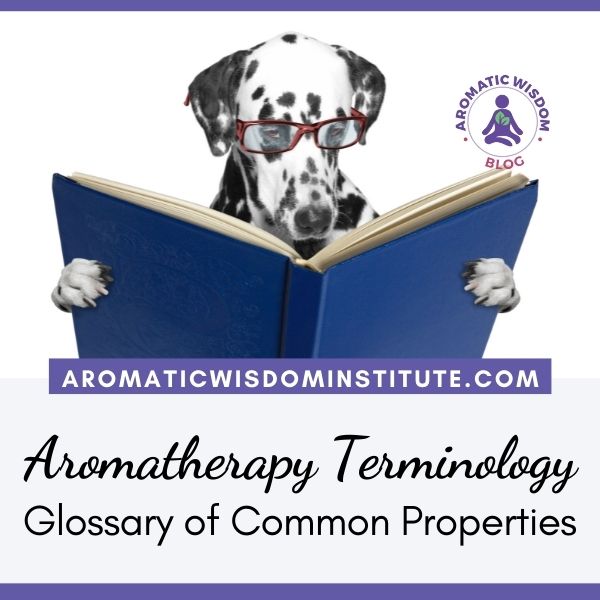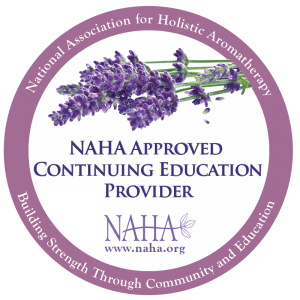Students and readers of the Aromatic Wisdom Blog often ask for an explanation of therapeutic terms like “galactagogue” or “anti-tussive”, especially after I post one of my popular Fragrant Friday blog posts in which I spotlight one essential oil and its benefits and properties. The list below should help a great deal. Let me know if I’ve missed any of the important terms.
If some of these words sound made up, know that they are, indeed, real terms to indicate real actions by essential oils and you’ll see them over and over in aromatherapy books and trade journals so I encourage you to become familiar with them.
Glossary of Essential Oil Properties and Aromatherapy Terms
- Abortifacient: Capable of inducing abortion
- Analgesic: Pain relieving
- Anti-angiogenic: Suppresses new blood vessels from forming, which may be useful in preventing tumor growth. However, it may also suppress fetal growth and should be avoided during pregnancy.
- Anthelmintic: Expels parasitic worms from the body by either stunning or killing them. They may also be called vermifuges (stunning) or vermicides (killing).
- Anti-bacterial: Destroys bacteria
- Anti-odontalgic: Relieves toothache
- Antiemetic: Reduces the severity of vomiting
- Anti-fungal: Inhibits the growth of fungus
- Anti-galactagogue: Impedes or lessens the flow of breast milk
- Anti-hemorrhagic: Prevents or combats bleeding
- Anti-infectious: Helps the body strengthen its own resistance to infective organisms and rid the body of illness.
- Anti-inflammatory: Alleviates inflammation
- Anti-phlogistic: Counteracts inflammation
- Anti-pruritic: Relieves or prevents the sensation of itching
- Anti-pyretic: Dispelse heat and fever
- Antiseptic: Assists in fighting germs and infections
- Anti-seborrheic: Helps control the oily secretion from sweat glands
- Anti-spasmodic: Relieves spasms of voluntary and involuntary muscles.
- Anti-sudorific: Lessens sweating
- Anti-rheumatic: Prevents and/or relieves rheumatic pain and swelling
- Anti-tussive: Capable of relieving or suppressing a cough
- Anti-toxic: Antidote or treatment to counteract the effects of poison
- Anti-viral: Inhibits the growth of viruses
- Aperient: Mild laxative
- Aphrodisiac: Increasing sexual desire and sexual functioning
- Astringent: Firms tissue and organs: reduce discharges and secretions
- Balsamic: Soothing medicine or application having the qualities of balsam
- Carminative: Relieves intestinal gas pain and distention; promotes peristalsis
- Carcinogenic: A substance that promotes cancer or cancerous growths
- Cephalic: A substance that is stimulating and clearing for the mind.
- Cholagogue: Stimulating the secretion of bile into the duodenum
- Choleretic: Helps the liver to excrete bile, leading to greater bile flow
- Cicatrisant: Promotes healing by cell regeneration and formation of scar tissue
- Cytophylactic: Action of increasing the leukocyte activity to defend the body against infections
- Colic: Pain due to contractions of the muscle of the abdominal organs
- Decongestant: Reduces nasal mucus production and swelling
- Demulcent: An agent that protects the mucus membranes and helps stop irritation
- Depurative: Helps to detoxify and to combat impurities in the blood and body
- Detoxifier: Helps to detoxify and combat impurities in the blood and body
- Diaphoretic: Causes perspiration and increased elimination through the skin
- Diuretic: Promotes activity of kidney and bladder and increases urination
- Dopaminergic: Helps to increase focus
- Emetic: Induces vomiting
- Emmenagogue: Helps promote and regulate menstruation. Helps the uterus to expel
- Emollient: Smoothes, softens, and protects the skin
- Expectorant: Promotes the discharge of phlegm and mucus from the lungs and throat
- Febrifuge: Helps to combat fever
- Galactagogue: Helps to increase the production and secretion of milk
- Hemostatic: Stops the flow of blood; and astringent that stops bleeding or hemorrhaging
- Hypotensive: Lowers blood pressure
- Immune stimulant: Stimulates function of the immune system
- Laxative: Promotes bowel movements
- Menorrhagia: Excessive blood loss during menstruation
- Mucolytic: Breaks down mucus (pulmonary)
- Narcotic: Substance that induces sleep
- Nervine: Strengthens the functional activity of the nervous system; may be either a stimulant or sedative
- Neurotoxin: A substance having a toxic or harmful effect on the nervous system
- Parturient: Assisting childbirth
- Pruritis: Itching
- Pyrosis: Heartburn
- Rubifacient: Increases local blood circulation, and can cause minor skin irritation, vasodilation, and local analgesic effect.
- Sedative: Calms and tranquilizes by lowering the functional activity of the organ or body part.
- Soporific: A substance that helps to induce sleep
- Stimulant: Increases functional activity of a specific organ or system
- Stomachic: Serve to tone the stomach, improving its function and increasing appetite
- Tonic: Strengthens and restores vitality
- Sudorific: Increases sweating
- Vasoconstrictor: An agent that helps the contraction of blood vessels
- Vasodilator: An agent that helps the dilation of blood vessels
- Vermifuge: Expels intestinal worms
- Vulnerary: An agent applied externally that helps to heal wounds and sores and prevent tissue degeneration
Are these words new to you?
Have I missed any?
Please leave a comment below!
Updated on May 1, 2025





These words are also available for herbal and aroma and any other kind of student in the dictionary. And most of the herbal and aromatherapy books have a glossary with words described.
Jeanne, as a veteran author of many wonderful books you make a great point! There should always be a glossary of terms somewhere within the book. Thanks for that reminder!
Great reference list! No one should live without this list!
I was just looking these up last night and writing them down. Thanks a million!
How about one of our favorites: Dopaminergic for focus and alertness?
Oh my goodness, Carol! You are such as smart cookie 🙂 How could I forget our old friend DOPAMINERGIC? Thank you!
LOLOL—your list came at just the right moment–I started my own list since I find these words constantly!! An angel! and I will make sure to add Dopominergic- though I will say I haven’t come across that one yet. Which oil has this property???
Thanks Liz!
What a great resource for the “general public” that are enthusiastic about EOs.
Hello Liz, why is “anesthetic” not included in list of therapeutic terms. Any clarity you can provide is appreciated.
Great question Anita! There are two kinds of pain relievers, analgesics and anesthetics. Analgesia is the relief of pain without total loss of feeling or muscle movement. Analgesics don’t always stop pain entirely, but they do lessen it. Anesthesia on the other hand, is blockage of all feeling, including pain and I don’t know of any essential oil that will completely anesthetize. Thanks for asking. Liz
I have copied this list and added that to mine.
Thank you for all the research to put this lest together. It makes it easier than looking each one up in a dictionary with the overwhelming definitions that are confusing and forgotten in a short amount of time. I end op forgetting and having to look them up again. These are nice and simple.